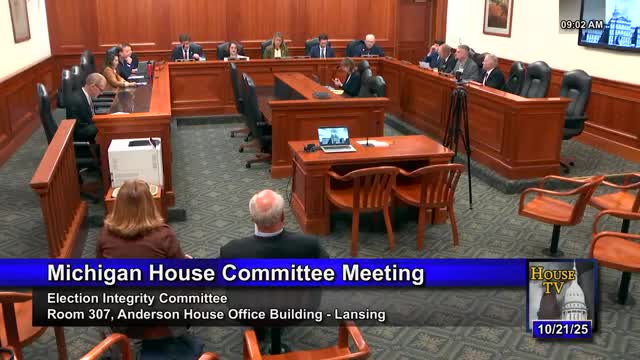House committee hears bill to remove party-affiliation box for nonpartisan candidates
Get AI-powered insights, summaries, and transcripts
Subscribe
Summary
Lawmakers and two Third Circuit judges told the House Committee on Election Integrity that House Bill 48 61 would stop candidates for nonpartisan offices from being disqualified over a confusing affidavit requirement; the committee heard testimony but took no vote.
The Michigan House Committee on Election Integrity heard testimony on House Bill 48 61 on a procedural change to candidate affidavits that sponsors say would prevent disqualification of nonpartisan candidates over party-affiliation paperwork.
Representative Outman told the committee, “I have a really simple bill for you this morning,” and described HB 48 61 as “a simple but important fix to Michigan's election law.” He said the bill would remove the requirement that candidates for explicitly nonpartisan offices declare a party affiliation on their affidavit of identity.
The change aims to address what supporters described as an unclear statutory requirement that in recent election cycles led to litigation and, in some cases, candidates being removed from the ballot for how they completed the form. The committee heard testimony from two Third Circuit Court judges who said the issue has had real consequences for judges and other nonpartisan candidates.
Judge Kelly Ramsey said the 2022 lawsuit stemming from her decision to leave the party-affiliation line blank caused “considerable stress, aggravation, and quite frankly, financial loss.” Ramsey described having personally filed her affidavit in Lansing on March 9, 2022, going through multiple staff, and being told by a supervisor that the affidavit was properly completed.
Judge Margaret Van Houten said the issue is broader than judicial races: “It impacts anybody running for nonpartisan office, council, mayor,” and recounted litigation in which a private challenger in 2022 sued to remove multiple candidates from the ballot in Highland Park. Van Houten and Ramsey said they seek statutory clarity to prevent future removals tied to affidavit formatting.
Committee members noted administrative fixes at the Secretary of State’s office may already partially address the issue. Representative Wooden asked for a copy of the current affidavit to compare it with the version that led to litigation; Representative Outman said he would provide the affidavit and that codifying the change would guard against future administrative variation.
The committee also read in proponent cards from clerks and state election officials. No committee vote on HB 48 61 was taken during the hearing.
The discussion referenced litigation in which the Michigan Supreme Court and lower courts were involved. Committee testimony cited Davis v. Highland Park City Clerk as the case that highlighted ambiguity in the law and noted Justice Viviano urged the legislature to remedy the unclear statutory language that led to the litigation.
The committee adopted its minutes from Sept. 30 by unanimous consent before taking up the bill. The hearing concluded after testimony and the reading of support cards; the committee did not record a vote on HB 48 61 during this session.
